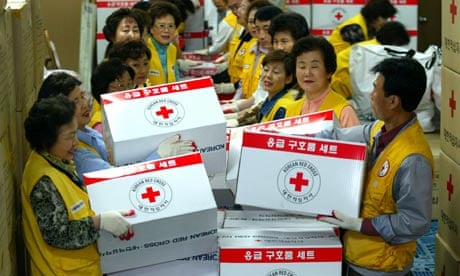Aid agencies working in North Korea have issued a rare joint appeal for increased food donations, warning that millions of vulnerable citizens are living on a knife edge.
The groups, which include Save the Children and the Swiss government's relief agency, say bad weather and livestock disease have hampered domestic production, while high global food and fuel prices are making it harder to import supplies. They fear that unless aid is increased now, it will be too late to support people who are already chronically malnourished through the lean season that begins in May.
Their warning comes days after a United Nations World Food Programme (WFP) assessment found the country was "highly vulnerable to a food crisis", with more than 6 million people in urgent need of international food aid. Today's joint statement highlighted the needs of children and mothers, the elderly, disabled and sickand pointed to a need for healthcare, water and sanitation as well as food.
"We fear there is donor fatigue with the Democratic People's Republic of Korea," said Katharina Zellweger, country director for the Swiss Agency for Development and Cooperation.
"So much with the DPRK boils down to political issues and then you forget the humanitarian principles," she said.
The North has been beset by chronic food problems since the famine that killed hundreds of thousands of its citizens in the 1990s, leaving it heavily reliant on aid.
However, a change of government in the South saw an end to Seoul's "sunshine policy" of freeflowing aid and other countries have become more reluctant to give because of the North's nuclear and missile tests, the shelling of a southern island and the sinking of a southern warship. The North denies attacking the vessel.
Andy Featherstone, the region's director of strategy for Save the Children, said: "We would hope [donors] would review decisions they have taken and be more generous in meeting the appeal [following the WFP assessment]."
Ireland's Concern Worldwide, Belgium's Handicap International and France's Triangle Generation Humanitaire also signed the statement.
The existing WFP scheme has only a third of the funding it needs, and groups say it must be scaled up in any case. The assessment issued last week said heavy rains during last autumn's harvest, a bitter and prolonged winter and a foot and mouth outbreak had damaged food supplies.
Other experts say botched currency and economic reforms have exacerbated the problems. Some critics have also suggested the country could be stockpiling food for next year, because Pyongyang has vowed the North will be fully established as a strong and prosperous nation in 2012.
